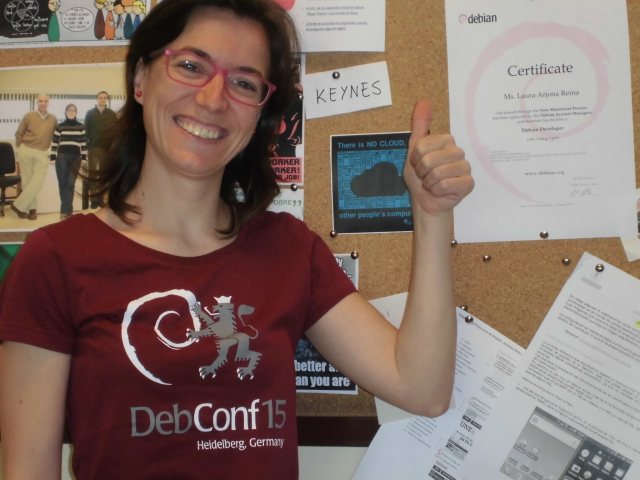Reproducible builds folks: Reproducible builds: week 50 in Stretch cycle
What happened in the reproducible
builds effort between April 3rd and April 9th 2016:
Media coverage
Emily Ratliff wrote an article for SecurityWeek called Establishing Correspondence Between an Application and its Source Code - How Combining Two Completely Separate Open Source Projects Can Make Us All More Secure.
Tails have started work on a
design for freezable APT repositories to make it easier and practical to perform reproductions of an entire distribution at a given point in time, which will be needed to create reproducible installation- or live-media.
Toolchain fixes
Alexis Bienven e submitted patches adding support for
SOURCE_DATE_EPOCH
in several tools: transfig,
imagemagick,
rdtool, and
asciidoctor. boyska submitted one for
python-reportlab.
Packages fixed
The following packages have become reproducible due to changes in their
build dependencies:
atinject-jsr330
brailleutils
cglib3
gnugo
libcobra-java
libgnumail-java
libjchart2d-java
libjcommon-java
libjfreechart-java
libjide-oss-java
liblaf-widget-java
liblastfm-java
liboptions-java
octave-control
octave-mpi
octave-nan
octave-parallel
octave-stk
octave-struct
octave-tsa
oar
The following packages became reproducible after getting fixed:
- apt-listchanges/2.88 by Robert Luberda.
- cgal/4.8-1 by Joachim Reichel.
- erlang-bitcask/2.0.2+dfsg-1 by Nobuhiro Iwamatsu.
- geneweb/6.08+git20160228+dfsg-2 by Guillaume Brochu.
- glance/2:12.0.0~rc2-1 uploaded by Thomas Goirand, original patch by Chris Lamb.
- gle-graphics/4.2.5-4 by Christian T. Steigies.
- maude uploaded by Andreas Tille, patch by Alexis Bienven e.
- psqlodbc/1:09.05.0100-3 by Christoph Berg.
- resource-agents/1:3.9.7-3 by Christoph Berg.
- vgabios/0.7a-6 by Reiner Herrmann.
- vim/2:7.4.1689-2 by James McCoy.
- xmhtml/1.1.10-2 by Graham Inggs with Reiner Herrmann's help.
- xscreensaver/5.34-2 uploaded by Tormod Volden, original patch by Sascha Steinbiss.
- rkward/0.6.5-1 uploaded by Thomas Friedrichsmeier, original patch by Philip Rinn.
- mailfilter/0.8.4-1 uploaded by Elimar Riesebieter, original patch by Chris Lamb.
- bind9/1:9.10.3.dfsg.P4-6 uploaded by Michael Gilbert, original patch by Reiner Herrmann.
- bzr/2.7.0- 3,4 by Jelmer Vernooij.
- samba/2:4.3.6+dfsg-2 uploaded by Mathieu Parent, fix by Jelmer Vernooij.
- fwupdate/0.5-3 by Mario Limonciello.
- paraview/5.0.1+dfsg1-1 by Anton Gladky.
- #819883 on debootstrap by Reiner Herrmann: tell tar to sort the archive members.
- #819885 on chktex by Sascha Steinbiss: use the time of latest
debian/changelogentry as documentation timestamp. - #819915 on kannel by Alexis Bienven e: use the time of latest
debian/changelogentry as documentation timestamp. - #819921 on basket by Alexis Bienven e: remove build date from debug info.
- #819965 on openarena-data by Alexandre Detiste: normalize file permissions before creating
.pk3archive. - #820016 on gabedit by Alexis Bienven e: sort object files used to build the executable.
- #820032 on bibledit-gtk by Alexis Bienven e: remove useless included
Makefile. - #820072 on synfig by Alexis Bienven e: remove build date from info output.
- #820148 on autopkgtest by Alexis Bienven e: fix install order to cope with locales with case insensitive globbing.
- #820152 on anope by Alexis Bienven e: remove build date from the version string.
- #820179 on aodh by Alexis Bienven e: remove build date from the documentation.
- #820183 on cython by Alexis Bienven e: add support
SOURCE_DATE_EPOCH. - #820194 on nasm by rain1: sorts keys when traversing hash tables used to build the documentation.
- #820226 on chrony by Alexis Bienven e: add support for
SOURCE_DATE_EPOCHto preset thentp_era_splitparameter. - #820457 on recode by Alexis Bienven e: use system
help2man. - #820522 on gtkspell by Alexis Bienven e: force shell to
/bin/shin exampleMakefile.
- An architecture agnostic summary has been added to the reproducible-tracker.json by Valerie Young to make it easy to parse whether a package is unreproducible anywhere.
- To find more reproducibility issues a new variation was added to the i386 builders, so that one build is done using a 32 bit kernel (686-PAE) and the other build is using a 64 bit kernel (amd64). (h01ger)
- Niko Tyni was the first to notice a bug due to this: #821182 perl: embeds kernel architecture information
- The 2nd builds are now done in fr_CH on amd64, de_CH on i386 and it_CH on armhf. (h01ger)
- The variation table has been updated to reflect the recent changes and various small bugs have been fixed. (h01ger)
 What happened in the
What happened in the 
 Portability toward other systems has been improved: old versions of GNU diff are now supported (Mike McQuaid), suggestion of the appropriate locale is now the more generic
Portability toward other systems has been improved: old versions of GNU diff are now supported (Mike McQuaid), suggestion of the appropriate locale is now the more generic 







 Note: 2015/10/16: I need to add some links but I won t delay this more, posting now, will edit later.
Summer ended long time ago, but believe me, I m still catching up with all the things that I began in June/July, all the things I left in August when I went holidays, and more things that appeared in August and September.
This is a long overdue post, I hope you bear with me for waiting so long, and writing (now) so long too!
June
In June, I was 100% sure that I would not attend
Note: 2015/10/16: I need to add some links but I won t delay this more, posting now, will edit later.
Summer ended long time ago, but believe me, I m still catching up with all the things that I began in June/July, all the things I left in August when I went holidays, and more things that appeared in August and September.
This is a long overdue post, I hope you bear with me for waiting so long, and writing (now) so long too!
June
In June, I was 100% sure that I would not attend 



 Ren Mayorga reported Debian
Ren Mayorga reported Debian  This year
This year  This is something different. It is something special. She is something special. I don't even remember how I stumbled upon her, actually. I think it was some suggested video somehow.
I feel deeply sorry for those who don't understand German. But that's the way it is, the text is in German. And it's touching. Take your time, listen to it in a relaxed environment, when you don't have any distraction.
This is something different. It is something special. She is something special. I don't even remember how I stumbled upon her, actually. I think it was some suggested video somehow.
I feel deeply sorry for those who don't understand German. But that's the way it is, the text is in German. And it's touching. Take your time, listen to it in a relaxed environment, when you don't have any distraction.
 Yes, the title is just a scootch self-aggrandising, but I m rather chuffed
with myself at the moment, so please forgive me.
It all started with my phone (a regular Samsung Galaxy S3) suddenly refusing
to boot, stuck at the initial splash screen ( Samsung Galaxy SIII
GT-I9300 ). After turning it off and on again a few times (I know my basic
problem-solving strategies) and clearing the cache, I decided to start
looking deeper. In contrast to pretty much every other Android debugging
experience ever, I almost immediately found a useful error message in the
recovery system:
Yes, the title is just a scootch self-aggrandising, but I m rather chuffed
with myself at the moment, so please forgive me.
It all started with my phone (a regular Samsung Galaxy S3) suddenly refusing
to boot, stuck at the initial splash screen ( Samsung Galaxy SIII
GT-I9300 ). After turning it off and on again a few times (I know my basic
problem-solving strategies) and clearing the cache, I decided to start
looking deeper. In contrast to pretty much every other Android debugging
experience ever, I almost immediately found a useful error message in the
recovery system: